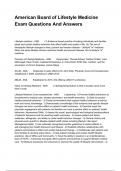American Board of Lifestyle Medicine
Exam Questions And Answers
Lifestyle medicine - ANS (1) Evidence-based practice of helping individuals and families
adopt and sustain healthy behaviors that affect health and quality of life. (2) The use of
therapeutic lifestyle changes to treat, prevent and reverse disease - Lifestyle "in" medicine.
When the same lifestyle choices maximize health and prevent disease, this is lifestyle "is"
medicine.
Pioneers of Lifestyle Medicine - ANS Hippocrates; Thomas Edison; Nathan Pritikin; John
McDougall; Dean Ornish; Caldwell B Esselstyn Jr; Hans Diehl; WHO Diet, nutrition, and the
prevention of chronic diseases; James Rippe
ACLM - ANS Organized in early 2004 by Dr John Kelly; Physician Core LM Competencies
established in 2009, published in JAMA 2010
ABLM - ANS Established in 2015, first offering LM2017 conference
Value of Lifestyle Medicine - ANS A distinguishing feature is that it actually saves more
than it costs.
Lifestyle Medicine Core competencies - ANS Leadership: 1) Promote healthy behaviors as
foundational to medical care, disease prevention, and health promotion - 2) Seek to practice
healthy personal behaviors - 3) Create environments that support healthy behaviors at school,
work and home; Knowledge: 1) Demonstrate a knowledge of the evidence that specific lifestyle
changes can have a positive effect on patients' health outcomes - 2) Describe ways that
physician engagement with patients and families can have a positive effect on patients' health
behaviors; Assessment Skills: 1) Assess the social, psychological and biological predispositions
of patients' behaviors and the resulting health outcomes - 2) Assess patient and family
readiness, willingness, and ability to make health behavior changes - 3) Perform history and
physical exam specific to lifestyle-related health status including lifestyle 'vital signs';
Management Skills: 1) Use nationally recognized practice guidelines to assist patients in
self-managing their health behaviors and lifestyle - 2) Establish effective relationships with
patients and families to effect and sustain behavioral change - 3) Collaborate with patients and
their families to develop action plans - 4) help patient manage and sustain health lifestyle
practices; Use of Office and Community: 1) Have the ability to practice in an interdisciplinary
team of HCPs - 2) Develop and apply office systems and practices to support lifestyle medical
care - 3) Measure processes and outcomes to improve the quality of lifestyle interventions - 4)
, Use appropriate community referral resources that support the implementation of lifestyle
medicine
Lifestyle change impacts the "cause of the cause" of disease - ANS 1) beneficially affecting
gene expression (epigenetics); 2) Reducing insulin resistance; 3) reducing chronic systemic
inflammation; 4) providing anti-oxidants; 5) more...
Health Risk Assessments - ANS Described in Sep 2013 AHRQ document; CDC source
Scientific evidence about unhealthy behaviors - ANS 1) Tobacco - Cochrane Collaboration,
AHA and USPSTF; 2) USPSTF; 3) Interheart Study; 4) interSTROKE study; 5) Chicago heart
Association Detection Project in Industry; 6) Framingham heart study; 7) Multiple Risk Factor
Intervention Trial Study; 8) Nurses' Health Study; 9) Lyon Diet Heart Study; 10) Adventist Health
Study 2; 11) Nurses Health Study, NHS2 and Health Professionals Follow Up Study; 12) World
Cancer Research Fund/American Institute for Cancer Research
Tobacco evidence - ANS Strong evidence that tobacco cessation, increased physical
activity and making dietary changes decrease mortality, morbidity, cancer (Cochrane, AHA,
USPSTF)
USPSTF recommended screening - ANS tobacco, alcohol and obesity
Interheart study - ANS 9 significant risk factors: smoking, lipids, HTN, obesity, diabetes,
diet, physical activity, alcohol and psychosocial factors account for 90% of PAR of AMI in men
and 94% in women: 5 risk factors: smoking, lipids, HTN, diabesity and obesity accounted for
80%
InterSTROKE study - ANS 10 significant risk factors for all strokes: HTN, current smoking,
abdominal obesity, unhealthy diet, physical inactivity, diabetes, alcohol intake, psychological
stress, depression , cardiac causes and abnormal lipids
6 changes reduce risk of heart disease by as much as 90-95% - ANS 50% decrease in
total cholesterol; 6 mmHg decrease in diastolic BP; stop smoking; maintain ideal body weight
and waist size; >150 min/week moderate exercise; >5 servings fruits and veggies a day
Lifestyle Medicine and its impact on disease pathophysiology - ANS Epigenetics: 1)
improves short and long term clinical outcomes by changing gene expression in favorable ways;
2) Prostate cancer gene expression was beneficially changed for 501 genes in 3 months on
GEMINAL study: Substrate: whole foods plant diet changes the "fuel" metabolism burns and
changes the microbiome
Transtheoretical Stages of change - ANS Precontemplation, Contemplation, Preparation,
Action, Maintenance, Relapse, Progress





